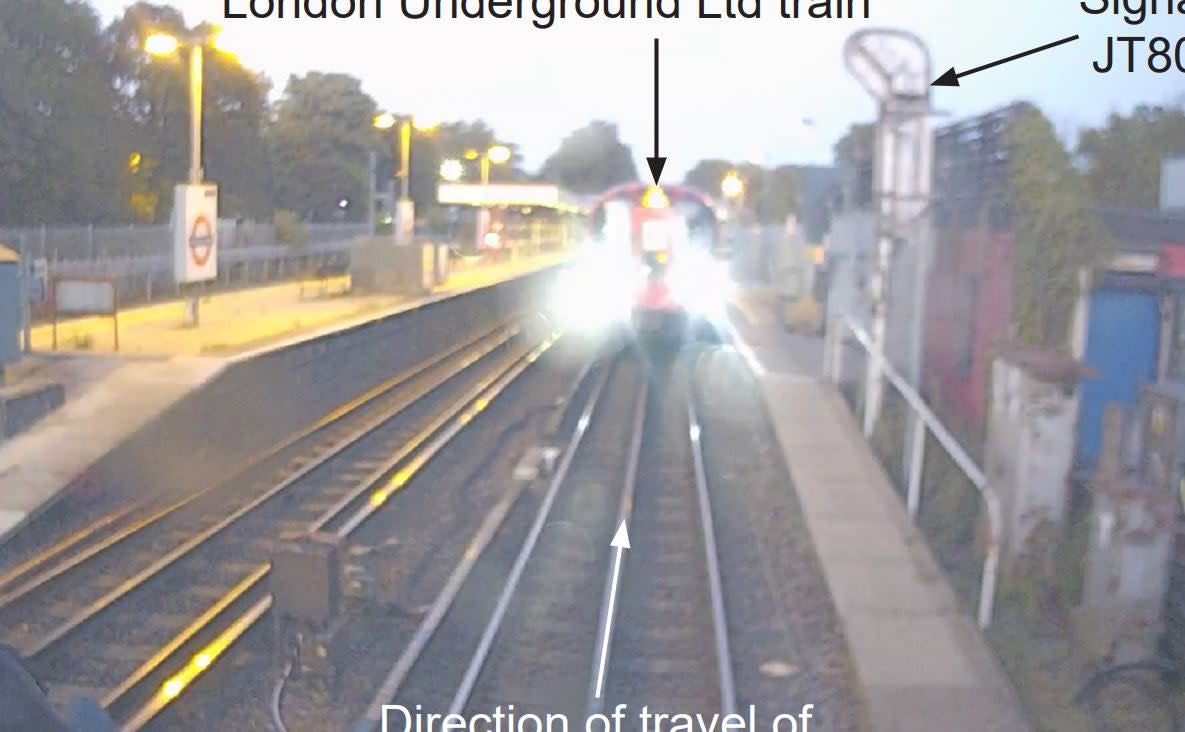‘Fatigued’ train driver with history of safety errors narrowly avoided crash

- Oops!Something went wrong.Please try again later.
A train driver with a history of safety blunders and an undiagnosed sleep condition narrowly avoided a head-on crash with another train, an investigation has found.
The man was operating a Chiltern Railways service when he missed a stop sign in Amersham, Buckinghamshire, while travelling to London Marylebone on June 21 last year, the Rail Accident Investigation Branch (RAIB) said.
His train, which was travelling at 60mph, was automatically halted. But because he did not recall passing the signal, he believed the activation of the safety system was “spurious” so he decided to restart the train without the necessary permission, the RAIB said.
He continued on, nearly crashing head-on into a Chesham-bound London Underground Metropolitan line train at Chalfont & Latimer station but stopped around 75ft (23m) away from it.
The RAIB said the driver, who was not named, was probably fatigued. Following the incident, the driver was diagnosed with obstructive sleep apnoea, which causes breathing to stop and start during sleeping, and can make sufferers feel very tired.
Watch: The most likely reasons why you're always so tired—and what you can do about it
The disorder was missed during his regular medical assessments, although he told RAIB investigators that he had “consistently suffered from poor quality sleep” for many years.
The driver had been involved in 15 previous safety-related incidents since he qualified in 2002 and had been restricted to driving empty trains to and from a depot between 2015 and 2018.
It is unclear whether the driver is still operating operator trains for the company, as a spokesperson refused to disclose this information.
The RAIB concluded that Chiltern Railways’ training and testing of drivers on what to do if a train’s safety system is activated was “not effective”.
It said that this could be a consequence of the operator struggling to recruit and retain driver managers, although the company’s request to increase the salary for the role of driver managers to solve the problem was declined by the Department for Transport as it had a policy of no new pay rises. This was in May 2020, a month before the incident.
The company had to obtain consent for such pay rises as the DfT had agreed to take on the revenue and cost risks of rail franchises due to coronavirus.
In October that year - four months after the Amersham incident - Chiltern Railways was given permission by the department to temporarily assign someone to a senior position to strengthen driver management.
The RAIB made a series of safety recommendations, including that the train company should improve its management of drivers, and review the risks associated with resetting train protection equipment on London Underground infrastructure.
A spokesman for Chiltern Railways said the operator had already adjusted some of its processes and procedures following the report.
He said: “The safety of our customers and staff is our top priority.
“We’ve taken on board the findings of the report from the RAIB. We have already responded to many of the findings in the report by adjusting our processes and procedures.
“Specifically, in recent weeks we have expanded and strengthened our driver management team with several new roles and new appointments.”
Additional reporting by PA
Watch: How to improve your sleep
Read More
Mandatory vaccines for students to attend lectures ‘hugely discriminatory’, universities union says
Pingdemic leaves nurseries in ‘chaos’ with many forced to suspend provision
Covid-19 cases drop for sixth day — but hospital admissions rise
Revealed: Britain’s oldest stained glass windows – hiding in plain sight for 900 years
Roofer uncovers decomposed body in flat three months after neighbours complain about smell
Schools closing could be behind drop in Covid cases, expert says

